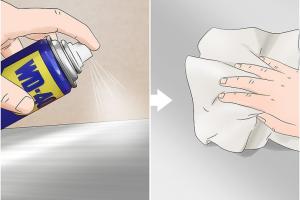Ultimate Guide on How to Protect Stainless Steel: Tips & Tricks

-
Quick Links:
- Introduction
- Understanding Stainless Steel
- Common Issues with Stainless Steel
- Preventing Corrosion
- Effective Cleaning Tips
- Using Protective Coatings
- Step-by-Step Care Guide
- Case Studies & Examples
- Expert Insights
- FAQs
Introduction
Stainless steel is a popular material known for its durability and aesthetic appeal. However, without proper care and protection, it can become susceptible to various forms of damage. This guide aims to provide comprehensive insights into protecting stainless steel surfaces, ensuring they remain in pristine condition for years.
Understanding Stainless Steel
Stainless steel is an alloy primarily made of iron, chromium, and nickel. Its unique properties, such as resistance to rust and tarnish, make it ideal for kitchen appliances, outdoor furniture, and many other applications. However, its protection requires a nuanced understanding of its composition.
Composition of Stainless Steel
The corrosion resistance of stainless steel is largely attributed to chromium, which forms a passive layer of chromium oxide on the surface. This layer protects the underlying metal from oxidation and staining.
Types of Stainless Steel
- 304 Stainless Steel: Most commonly used, ideal for kitchen appliances.
- 316 Stainless Steel: Contains molybdenum, making it resistant to chlorides, ideal for marine applications.
- 430 Stainless Steel: A lower-cost alternative, less resistant to corrosion.
Common Issues with Stainless Steel
Despite its durability, stainless steel can face several issues, including:
- Corrosion: Often caused by exposure to harsh environments.
- Scratches: Can occur from abrasive cleaning materials.
- Stains: Especially from food, oils, and water spots.
Preventing Corrosion
Corrosion is one of the biggest threats to stainless steel. Here are effective strategies to prevent it:
- Regular Cleaning: Clean stainless steel surfaces regularly with mild soap and water.
- Drying: Always dry the surface after cleaning to prevent water spots.
- Use of Protective Products: Apply products specifically designed for stainless steel protection.
Effective Cleaning Tips
Proper cleaning is essential for maintaining the aesthetic appeal and longevity of stainless steel. Here are some effective tips:
- Use Mild Detergents: Avoid harsh chemicals that can damage the surface.
- Soft Cloths: Use microfiber cloths to avoid scratching.
- Make Your Own Cleaner: A mixture of vinegar and water can effectively clean and shine stainless steel.
Using Protective Coatings
Protective coatings can significantly enhance the longevity of stainless steel. Consider the following options:
- Wax Coating: Provides a protective layer against scratches and stains.
- Sealants: Create a barrier against moisture and contaminants.
Step-by-Step Care Guide
To ensure your stainless steel surfaces remain protected, follow this comprehensive care guide:
- Gather necessary cleaning materials: mild soap, water, microfiber cloths, and optional protective products.
- Clean the surface with the soapy water solution and a soft cloth.
- Rinse thoroughly to remove any soap residue.
- Dry the surface completely with a clean cloth.
- Apply a protective coating if necessary, following manufacturer instructions.
Case Studies & Examples
Several businesses have successfully implemented stainless steel care practices. For instance:
Case Study 1: Restaurant Kitchen
A high-end restaurant implemented a rigorous cleaning schedule for their stainless steel appliances, resulting in a significant reduction in wear and tear over time.
Case Study 2: Marine Equipment
A marina used 316 stainless steel for their docking equipment, applying protective coatings and regular maintenance, which extended equipment life considerably.
Expert Insights
Experts recommend that, regardless of the application, stainless steel should be treated with respect. Regular maintenance and timely protective measures can save both time and money in the long run.
FAQs
1. How often should I clean stainless steel?
It’s recommended to clean stainless steel surfaces at least once a week, or more often if they are heavily used.
2. Can I use bleach on stainless steel?
No, bleach can cause discoloration and corrosion. Stick to mild detergents.
3. What is the best way to remove scratches?
For minor scratches, you can use a specialized stainless steel cleaner or polish.
4. Are there any natural cleaners for stainless steel?
Yes, a mixture of vinegar and olive oil works effectively as a natural cleaner.
5. How do I prevent fingerprints on stainless steel?
Using a protective coating can help reduce the appearance of fingerprints.
6. Can stainless steel rust?
Yes, if the protective chromium layer is damaged or if it is exposed to harsh environments.
7. What type of cloth should I use for cleaning?
Microfiber cloths are ideal as they are soft and non-abrasive.
8. Is stainless steel safe for food preparation?
Yes, stainless steel is considered safe and is commonly used in kitchens.
9. How can I restore the shine of dull stainless steel?
Using a stainless steel polish can help restore its original shine.
10. What should I do if I notice corrosion?
Act promptly by cleaning the area and applying a protective coating if necessary.
In conclusion, protecting stainless steel requires a proactive approach to cleaning and maintenance. By following the guidelines in this article, you can ensure that your stainless steel surfaces remain beautiful and functional for years to come.
Random Reads
- How to upgrade a laptop replace parts
- Ultimate guide installing software linux
- How to seal wood
- How to seal a door
- How to seal pavers
- How to open zip rar 7z archives android
- How to operate cb radio
- How to view your wifi password on iphone
- Mastering lux thermostat programming guide
- How to move heavy furniture upstairs